Treesong's Blog: Treesong on Goodreads - Posts Tagged "cli-fi"
Fall Harvest Sale
In other news, have you checked out my climate fiction blog? Goodbye Miami is the tale of an American climate refugee who is displaced by Hurricane Florence in the year 2030. Follow Kass's adventures by visiting the Goodbye Miami blog and liking Goodbye Miami on Facebook. Life has been quite busy lately. I have plenty of other news and thoughts to share, but I'll save that for another entry after the sale. In the meantime, I hope you enjoy Change and Goodbye Miami!
Recent Climate Fiction And Nonfiction
I often find myself at a loss for what to do about the climate crisis. Climate science indicates that we're cooking the planet. Human civilization as we know it will probably end soon if we continue with our current course of action. So far, nothing seems sufficient to change our course. So what am I going to do about it? I'm going to review some books about the climate!
Here are a few quick reviews of some of the climate fiction and nonfiction books I've read in the past several months. I may do longer reviews later if there is sufficient interest. In the meantime, I wanted to write up at least a few short review in the hopes that you will be inspired to read some of these books too. I don't have all of the answers, but I know that informing ourselves and exploring where our choices may take us can only help. The following stories vary in their degree of realism, contributions to the discourse, etc., but they all contribute something meaningful.
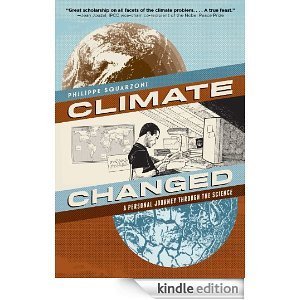 Climate Changed: This is an amazing book. This non-fiction graphic novel explores the author's personal journey as he learns about the science behind global warming. Even if you don't find his personal story or artistic flourishes compelling, this book is worth a read for the remarkably informative and moving exploration of the basic science and its implications for our present and future. This is essential material presented in a textually engaging and visually stimulating format. Basically, if you live on Planet Earth in the early 21st century, you should read this book!
Climate Changed: This is an amazing book. This non-fiction graphic novel explores the author's personal journey as he learns about the science behind global warming. Even if you don't find his personal story or artistic flourishes compelling, this book is worth a read for the remarkably informative and moving exploration of the basic science and its implications for our present and future. This is essential material presented in a textually engaging and visually stimulating format. Basically, if you live on Planet Earth in the early 21st century, you should read this book!
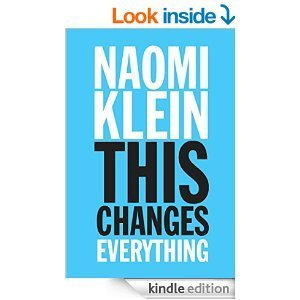 This Changes Everything: This book is a remarkable exploration of global warming from a social, economic, political, and historical perspective. The author discusses the roots of the climate crisis, what we can do about it, and a bit of her own personal experiences and realizations along the way. Her ability to weave these otherwise dry and depressing facts into a compelling story is a major part of what sells the book. The only reason that I gave it 4/5 stars is because the structure suffers a bit from this approach, jumping back and forth between topics with some repetition. For new readers who are just learning this material, though, her enthusiasm and the vital importance of this information will more than make up for the meandering nature of the narrative.
This Changes Everything: This book is a remarkable exploration of global warming from a social, economic, political, and historical perspective. The author discusses the roots of the climate crisis, what we can do about it, and a bit of her own personal experiences and realizations along the way. Her ability to weave these otherwise dry and depressing facts into a compelling story is a major part of what sells the book. The only reason that I gave it 4/5 stars is because the structure suffers a bit from this approach, jumping back and forth between topics with some repetition. For new readers who are just learning this material, though, her enthusiasm and the vital importance of this information will more than make up for the meandering nature of the narrative.
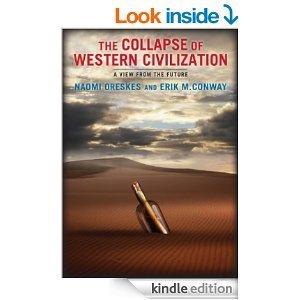 The Collapse of Western Civilization: This is an excellent and thought-provoking exploration of what the future of civilization may be like as a result of global warming. It also explores how such civilizations may view our tragic inability to avert the climate crisis. The fact that the authors incorporated extensive references to real-world events, trends, data, etc. from our time really helped this story in at least two important ways. It enhanced the illusion of this being a non-fiction text from the future and also served to highlight many important real-life facts about the climate and related issues. There are a few moments where I felt like the authors themselves were the ones doing the lecturing rather than our post-apocalyptic historian. On the whole, though, this was a remarkably prescient, relevant, and enjoyable read.
The Collapse of Western Civilization: This is an excellent and thought-provoking exploration of what the future of civilization may be like as a result of global warming. It also explores how such civilizations may view our tragic inability to avert the climate crisis. The fact that the authors incorporated extensive references to real-world events, trends, data, etc. from our time really helped this story in at least two important ways. It enhanced the illusion of this being a non-fiction text from the future and also served to highlight many important real-life facts about the climate and related issues. There are a few moments where I felt like the authors themselves were the ones doing the lecturing rather than our post-apocalyptic historian. On the whole, though, this was a remarkably prescient, relevant, and enjoyable read.
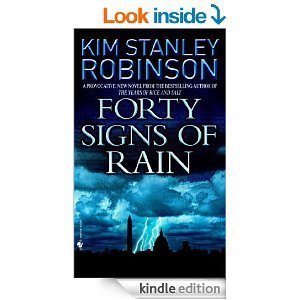 Science in the Capital Series: This three-book series is a remarkable exploration of the role of science and scientific institutions in shaping American and global policy related to climate change. It explores important concepts such as the "capture" of government agencies by private industry, the increasing push for geoengineering as a "solution" to the climate crisis, and the human costs of rising sea levels. The inclusion of Buddhist characters and themes also creates an interesting comparison and contrast between ways of thinking in scientific communities and Buddhist perspectives on knowledge and life. I love the level of detail that the characters delve into when examining scientific and philosophical questions. My two main critiques are that it (a) doesn't seem nearly critical enough of geoengineering [though this is possibly just meant to be an accurate portrayal of scientists who are convinced of its importance]; (b) seems to wrap up the major plot points in the third book almost as an afterthought. Regardless of my critiques, though, I highly recommend reading this series if you have any interest in any of its major themes: geoengineering as an alleged solution to the climate crisis; the role of scientific institutions in determining our response to climate change; and the similarities and differences between scientific perspectives and Buddhists perspectives.
Science in the Capital Series: This three-book series is a remarkable exploration of the role of science and scientific institutions in shaping American and global policy related to climate change. It explores important concepts such as the "capture" of government agencies by private industry, the increasing push for geoengineering as a "solution" to the climate crisis, and the human costs of rising sea levels. The inclusion of Buddhist characters and themes also creates an interesting comparison and contrast between ways of thinking in scientific communities and Buddhist perspectives on knowledge and life. I love the level of detail that the characters delve into when examining scientific and philosophical questions. My two main critiques are that it (a) doesn't seem nearly critical enough of geoengineering [though this is possibly just meant to be an accurate portrayal of scientists who are convinced of its importance]; (b) seems to wrap up the major plot points in the third book almost as an afterthought. Regardless of my critiques, though, I highly recommend reading this series if you have any interest in any of its major themes: geoengineering as an alleged solution to the climate crisis; the role of scientific institutions in determining our response to climate change; and the similarities and differences between scientific perspectives and Buddhists perspectives.
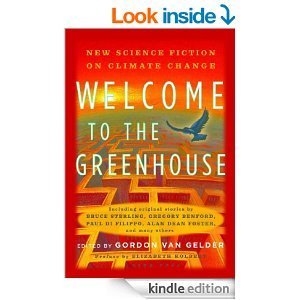 Short Story Collection: If you're interested in climate fiction (cli-fi), check out this book. As with many short story anthologies, the quality of each story and its relevance to the theme is very hit or miss. Honestly, there were times when I thought I'd give this book a lower rating. However, there are several strong stories in here that definitely should not be missed. Even the stories that fall flat as works of literature usually still raise important questions and present important visions of a world experiencing the dramatic consequences of global warming.
Short Story Collection: If you're interested in climate fiction (cli-fi), check out this book. As with many short story anthologies, the quality of each story and its relevance to the theme is very hit or miss. Honestly, there were times when I thought I'd give this book a lower rating. However, there are several strong stories in here that definitely should not be missed. Even the stories that fall flat as works of literature usually still raise important questions and present important visions of a world experiencing the dramatic consequences of global warming.
Last but not least, I'd like to give a shout-out to my own climate fiction. Since I'm the author, I'm providing a short synopsis rather than a review. I encourage you to Read, Rate, and Recommend these books. This helps more people to learn about my work and also encourages more conversation and action about climate change!
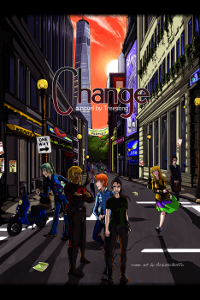 Change: Sarah Athraigh, an environmental activist from Southern Illinois, stumbles into the midst of a hidden war between occult factions that are grappling with the root causes and dire consequences of climate change. As she goes on the run, she soon finds herself on a journey of discovery, searching for the unusual allies and innovative ideas that will help her to make a difference for the better in a dangerous world.
Change: Sarah Athraigh, an environmental activist from Southern Illinois, stumbles into the midst of a hidden war between occult factions that are grappling with the root causes and dire consequences of climate change. As she goes on the run, she soon finds herself on a journey of discovery, searching for the unusual allies and innovative ideas that will help her to make a difference for the better in a dangerous world.
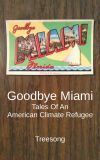 Goodbye Miami: Kass, an American climate refugee, flees Miami in the wake of a hurricane that leaves most of the city underwater. After moving in with her cousin in Southern Illinois, Kass struggles to deal with her displacement. She hopes to find a way to return to the city that she loves. But thanks to global warming, that city is now underwater. What starts as a search for survival quickly evolves into a struggle for the future of Miami -- and the world.
Goodbye Miami: Kass, an American climate refugee, flees Miami in the wake of a hurricane that leaves most of the city underwater. After moving in with her cousin in Southern Illinois, Kass struggles to deal with her displacement. She hopes to find a way to return to the city that she loves. But thanks to global warming, that city is now underwater. What starts as a search for survival quickly evolves into a struggle for the future of Miami -- and the world.
Summer Cli-Fi Sale
I’m pleased to announce that I’m having a summer sale on climate fiction (cli-fi). My two novels, Change and Goodbye Miami, are on sale on Amazon for just 99 cents from August 19 through August 26. My short story collection, Strange Beginnings, is also available for free on Amazon from August 18 through August 22.
 In Change, Sarah Athraigh, an environmental activist from Southern Illinois, stumbles into the midst of a hidden war between occult factions that are grappling with the root causes and dire consequences of climate change. As she goes on the run, she soon finds herself on a journey of discovery, searching for the unusual allies and innovative ideas that will help her to make a difference for the better in a dangerous world.
In Change, Sarah Athraigh, an environmental activist from Southern Illinois, stumbles into the midst of a hidden war between occult factions that are grappling with the root causes and dire consequences of climate change. As she goes on the run, she soon finds herself on a journey of discovery, searching for the unusual allies and innovative ideas that will help her to make a difference for the better in a dangerous world.Buy Change on Amazon: http://smile.amazon.com/Change-ebook/...
 In Goodbye Miami, Kass, an American climate refugee, flees Miami in the wake of a hurricane that leaves most of the city underwater. After moving in with her cousin in Southern Illinois, Kass struggles to deal with her displacement. She hopes to find a way to return to the city that she loves. But thanks to global warming, that city is now underwater. What starts as a search for survival quickly evolves into a struggle for the future of Miami — and the world.
In Goodbye Miami, Kass, an American climate refugee, flees Miami in the wake of a hurricane that leaves most of the city underwater. After moving in with her cousin in Southern Illinois, Kass struggles to deal with her displacement. She hopes to find a way to return to the city that she loves. But thanks to global warming, that city is now underwater. What starts as a search for survival quickly evolves into a struggle for the future of Miami — and the world.Buy Goodbye Miami on Amazon: http://smile.amazon.com/Goodbye-Miami...
 Strange Beginnings is a collection of short stories by yours truly. These tales all take place in the same setting as my cli-fi novel, Change, and all relate in some way to the theme of strange beginnings — and often strange endings.
Strange Beginnings is a collection of short stories by yours truly. These tales all take place in the same setting as my cli-fi novel, Change, and all relate in some way to the theme of strange beginnings — and often strange endings.Download Strange Beginnings for FREE on Amazon: http://smile.amazon.com/dp/B00K7B9SSC
Climate fiction, also known as cli-fi, is a newly emerging genre of fiction. Cli-fi stories explore the role of the climate and human-caused climate change in our lives. They range in tone from post-apocalyptic tales of survival to present-day tales of activism and advocacy for climate justice. In addition to providing quality entertainment, cli-fi stories also provide a unique opportunity to reflect on the real-world climate crisis and our responses to it. Cli-fi authors use the ancient art of storytelling to explore global warming and related issues in a way that goes beyond what any charts or graphs can offer. Compelling characters and exciting plots draw the reader in and may inspire them to feel more personally invested in responding to the real-world climate crisis.
In related news, I’m currently working on two other cli-fi books: a sequel to Change called Order and a short story collection with the working title Cli-Fi Plus. I’ve also recently started work on my first superhero-themed novel. To receive the latest updates on my writing and superhero adventures, please sign up for my newsletter. Also, please share this post with anyone you know who may be interested cli-fi. Thanks!
This post originally appeared on my blog.
Book Review: The Windup Girl by Paolo Bacigalupi
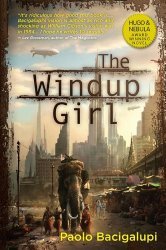
This novel works so well on so many levels. I found the surreal post-apocalyptic setting and the colorful cast of character compelling from the very beginning. As the story progressed, it became clear to me just how fascinating, complex, and meaningful this story is. The technology, ecology, economy, culture, and characters all intersect and interact to create plots and character development that possess a rare combination of both depth and urgency. If I had more spare time, I would have been tempted to read the entire novel in a single sitting. I'm glad I didn't, though, because there is too much good material here to digest in a single sitting. Fully appreciating the setting, the characters, and the meaning behind it all takes time -- but it's well worth the effort.
The story explores some of the extremely negative potential outcomes of bioengineering. Proponents of bioengineering might very well have a knee-jerk reaction, assuming that the entire novel is just a fear-based screed against the dangers of bioengineering. However, Bacigalupi's exploration of the topic is surprisingly nuanced and introspective. Yes, there are horrors -- an endless parade of corporate-engineered plagues, bizarre bioengineered creatures, and so on. But there are also curiosities and wonders. The author's presentation of bioengineered horrors is not so much a critique of biengineering itself as it is a critique of the individuals and corporations that would apply the technology of life to the ruthless pursuit of profit and power.
The exploration of human-caused global warming is a less central focus of the novel, yet still a major thread in the weaving of this complex narrative. As an author with an emphasis on climate fiction, human-caused global warming tends to be at the center of the plot of many of my stories. Bacialupi, however, chooses to incorporate it as prominent part of the setting rather than making it the driving force behind the advancement of the plot. This story takes place in a world that is suffering from the consequences of global warming and the end of the fossil fuels era. Simply presenting this as a fact of the setting rather than making it a turning point of the plot actually places a quiet but powerful emphasis on his presentation of the future realities of global warming. It's just a given; in the future, no one is contesting the existence or effects of global warming. It's just a reality that everyone has to deal with, reflected in many aspects of their society -- from transportation to energy sources and beyond.
The Windup Girl also features several explorations of how race and ethnicity impact identity and basic survival in times of upheaval. As a person of European ancestry living in the United States, it was very interesting (and illuminating!) for me to see the pale-skinned, blue-eyed "farang" (white) characters portrayed as foreign and dangerous. That may sound offensive to some people, but I actually found it to be quite appropriate and a very well-written aspect of the plot and character development. It was also interesting to see the relationships between the native Thais, the Malaysian Chinese, the Japanese, and the bioengineered "windups" or "New People".
There are some books -- especially in the realm of speculative fiction -- that I would only recommend to certain audiences. Zombie fiction is for zombie fans; romance novels are for romance fans; and so on. The Windup Girl, however, is a novel that I would recommend to everyone alive today in the early twenty-first century. Some of the technological elements and drastic changes that have taken place in society will seem strange to readers who don't usually read speculative fiction. However, the importance of the themes explored -- and the artful and compelling way in which they are explore -- makes this novel a worthwhile read for everyone who cares about the future of life on this planet!
Book Review: Loosed Upon the World: The Saga Anthology of Climate Fiction
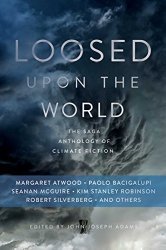
This volume brings together an impressive collection of authors with a wide range of writing styles and a variety of takes on the broadly-defined theme. As with almost any anthology, there are hits and misses. There were a few stories I'd read before, one of which is honestly not among my favorites and wasn't what I have in mind when I think of climate fiction. However, even the "misses" were still decent works of fiction that only suffered in comparison to the groundbreaking work in the rest of the anthology.
I was glad to see contributions by Margaret Atwood, Kim Stanley Robinson, and Paolo Bacigalupi. These three big names were already familiar to me and are essential reading for the emerging cli-fi genre. Robinson's piece was an excerpt from his Science in the Capital Trilogy
My favorite part of this anthology was the wide variety of writing styles and content choices. If I had to pick one story that stood out, though, I'd go with "The Precedent" by Sean McMullen. This story's premise is so dark and apocalyptic that it could have gone horribly wrong in the hands of a lesser author. However, for me, the vivid descriptions and rich characterization give this story a very real feel in spite of the incredibly stark plot and setting. This story speaks powerfully to the horrors of the climate crisis, challenge us to reflect on those horrors and our involvement in them without shoving any particular solution down our throats.
I would recommend this book both to readers who are looking for good cli-fi and to readers who are looking for good fiction in general. From now on, this will be the anthology that I recommend to people who are looking for an introduction to climate fiction.
Book Review: The Warming by Lorin R. Robinson
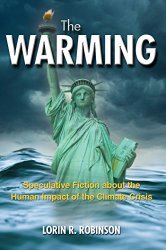
Let me start by describing what I like.
The Warming is an ambitious effort to explore many aspects of the climate crisis and its impact on the future of humanity. Rather than picking a single timeframe, location, or even storyline, the author explores the impacts of "The Warming" (anthropogenic global warming) over the course of several decades, on several continents, and in the lives of several distinct sets of characters. The scope of these narratives ranges from small personal tales to epic stories involving the ultimate fates of entire cities and nations. The possibilities explored range from dystopian destruction of existing infrastructure to utopian visions for how to survive and thrive in the aftermath of The Warming.
Some of these ideas were nothing new. Others were entirely new and unexpected. Some were so interesting that I intend to do some research about whether they were pure fiction or if they have some basis in reality. Either way, this book is worth reading if only as a collection of interesting ideas related to the climate crisis.
That's the good news. Now, on to the bad news, or at least the "definitely not five stars" news.
I don't know what to call this book. Is it a novel? The author calls it a novel, but the organizational structure is more reminiscent of a short story anthology. The author explains this unusual structure in an "important note for the reader" at the beginning of the book. The fact that this was an intentional choice -- a choice explained by the author at the very beginning -- made it more palatable. It weaves together three separate components: a primary twelve-chapter narrative about a marine biologist; a secondary narrative about an environmental news reporter; and several distinct short stories that provide some background about what's going on in the world outside of the main plotlines.
The originality and unusualness of this organizational structure initially intrigued me. I found it to be an interesting experiment both as a fellow author and as a reader. However, the more I read, the more this three-in-one structure just seemed overly busy. I would have preferred to read three shorter books: the marine biologist novel, the news reporter screenplay, and the short story anthology. They could have even been bundled in different sections of the same book since they take place in the same broad setting. However, having them split up and inserted in between each other just seemed to break the flow of the narratives. If the author is insistent that this structure is the right one for this book, then maybe this structural difficulty can be smoothed out a bit by more blatant transitions between the three elements -- for example, calling them "CHAPTER X", "EPISODE Y", and "STORY Z".
The book could also benefit from another round of basic editing. The average reader may not mind the occasional typos and style quirks, but fellow authors and industry professionals will find them distracting.
I also wasn't terribly impressed with the main narrative about the marine biologist. The ideas it explored were very interesting, but the characters and plot were lukewarm. The short stories were generally more impressive because they took a single interesting climate-related scenario and explored it succinctly from beginning to end. The main narrative (and to a lesser extent, the news reporter narrative) explored some very interesting ideas, but the characters themselves fell flat. The main character seems to be having a fairly standard-issue midlife crisis that unsurprisingly takes an adventurous and exciting turn. The supporting characters seem like little more than foils to the main character's plot arc and character development. It's not that there's necessarily anything wrong with a novel centered around a man's midlife crisis and how it relates to the climate crisis. But I feel like it will have a strong appeal to a certain male demographic, and not as much appeal to other audiences. It's interesting to a degree, but it lacks the universal appeal that I would expect from a story centered on a universal topic like the climate crisis.
In the end, the saving grace of this novel was the strength of the ideas it explores. I found myself more than willing to stick with the lukewarm elements of the novel because it centered around some interesting problems and solutions associated with the climate crisis.
Book Review: Ruby and the Blue Sky by Katherine Dewar

The author handles the recurring theme of climate change and climate action very well. Climate action is central to the plot, so there's a fair amount of discussion of what the characters are doing in response to the climate crisis. This approach always runs the risk of feeling forced or devolving into a lecture about climate policy. But the first person narrative, robust characterization, and compelling plot all worked together to keep me immersed in the story and involved in the theme without feeling like I was being lectured to.
The use of two narrators was interesting. Most of the story is told in the first person by the protagonist, but between her chapters, there are shorter chapters told from the perspective of the antagonist. I was initially skeptical of this approach because it's not very common, but I felt that the author used it very well in this case. The result is two very distinct voices telling the story from two very different perspectives. I appreciated the opportunity to see some of the motivations and depth of both characters, although unsurprisingly, the protagonist is the more well-developed of the two. They came together well to tell a single story.
In addition to the climate theme, there's a whole plot arc that deals with the theme of violence against women and empowerment and healing for survivors. At first, I was concerned that this might be too triggering for some readers and might take the novel in an entirely different direction. Since I'm not a woman myself, I may not be the best judge of how the topic was handled. To me, however, it seemed like it was handled well. The violence was acknowledged, but the emphasis was on empowerment and healing, both for survivors and for their friends and families. I thought it was a very meaningful and personal exploration of the theme. Hopefully it will be healing rather than triggering for readers who are themselves survivors.
Ruby and the Blue Sky is a great example of a novel that tells a nuanced and compelling story, populated with interesting characters, who happen to be grappling with their personal and collective responses to the climate crisis. Any reader could pick up this book simply because they wanted a good read, and walk away from it with some significant food for thought about global warming. That strikes me as the type of climate fiction that may have the greatest impact in the long run. Casual readers will pick it up because they've heard it's a good story and find themselves wondering if they should take any climate actions of their own.
To be honest, I'm not entirely sure that the approach the characters take to climate action would be an effective approach for the real world. But it's an approach that I can easily see people trying. It also got me thinking. Would it actually be effective? If not, what would work better? What would I do differently? These sorts of questions lead to productive thinking and dialog on the subject. They also show that I enjoyed the novel enough to take it seriously and really think it over. Those are both good signs of a good novel.
I definitely recommend Ruby and the Blue Sky to everyone who enjoys good fiction. If you have a special interest in climate fiction, then you'll definitely want to read this book.
Book Review: Ship Breaker by Paolo Bacigalupi
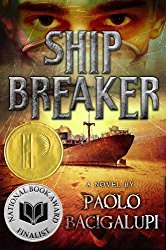
Ship Breaker is set in a distant future where the world has succumbed to the ravages of climate change and the resulting societal collapse. The main character is a young scavenger named Nailer who lives on the beach and spends his days crawling around in old shipwrecks, ripping out copper wire and any other valuables he can find for his crew to sell. His whole world is turned upside down when he comes across the salvage opportunity of a lifetime which turns out to be the start of an exciting adventure.
I thoroughly enjoyed Ship Breaker for several reasons.
The novel works well as young adult (YA) fiction. It addresses many of the most common YA themes -- family problems, friendship, betrayal, coming of age, young romance, etc. It touches all of the familiar bases without being formulaic or overly predictable. This depth of character and plot is greatly facilitated by a very well-developed setting. The setting is dystopian, but it's not the vague and generic dystopia portrayed in some YA fiction. It's a complex, gritty, realistic world that is revealed to us bit by bit through the eyes of the main character. Vivid description of this setting and the characters who populate it make this story stand out from the rest of the genre. There are several moments of violence that may be too much for really young or sensitive readers, but it all felt very appropriate to the plot and was treated very seriously and realistically rather than being glorified or sanitized.
I also like the fact that this novel works well for adults. Some YA ficton is so caught up in melodramatic genre tropes that it becomes unreadable for anyone who's grown out of their angsty teen phase. Ship Breaker leans in the opposite direction -- an excellent story that happens to include some young characters at the center of the action. The author has done a great job of crafting a tale that's accessible to young adults but mature and robust enough for older readers.
Of course, as a climate fiction author myself, one of my favorite parts of the novel is the way that it addresses climate change. The story takes place in a future setting where sea level has risen considerably, drowning coastal cities and contributing to the collapse of society as we know it. Most of the book doesn't explicitly talk about climate change, but the whole setting is a constant reminder of the consequences of our actions if we continue along our current emissions trajectory. This is a great way to get the message across without explicitly emphasizing it. There's also a point, though, where characters do explicitly discuss climate change and how their actions may contribute to it. I felt that it was handled very well -- letting the characters talk about it at a natural moment for them without having it seem forced or heavy-handed.
I would definitely recommend Ship Breaker both to young adult readers and to any older adults with an interest in climate fiction, dystopian fiction, biopunk, or any related genres. Paolo Bacigalupi is an excellent author, and I'm looking forward to seeing the film adaptation of Ship Breaker as soon as it comes out.
My new novel, Order, now available for pre-order!
Order will be released on October 31, 2019. Pre-order the Kindle edition today and have it delivered to your device automatically when it's ready. If you prefer the print version, check back here on October 31 for the link. Be sure to sign up for my newsletter to ensure that you don't miss this and other news about my fiction and superhero adventures.
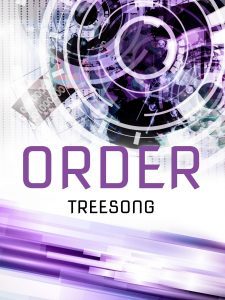 The basic premise of Order is simple. If you had all the power in the world, would you stop climate change?
The basic premise of Order is simple. If you had all the power in the world, would you stop climate change?Truman Stuart is a man on a mission. As the new Preceptor of Order, it’s his job to oversee the survival and progress of human civilization. When he discovers that climate change poses an existential threat to humanity, the Preceptor knows that he has to find a way to stop it. But how can he solve a global crisis that his own organization and its powerful fossil fuel allies helped create?
Order is a contemporary fantasy tale featuring a powerful secret society, glimpses of magic and hypertech, an underground resistance called Anomalous Revolution, and a colorful cast of characters that the Preceptor meets along the way as he searches for solutions to the climate crisis.
Order is the sequel to my first novel, Change. You can read Order before, after, or independently of Change. It explores several of the major events of Change from a different perspective, while also exploring many new events not referenced in Change.
Change explores the climate crisis from an "outsider" or "activist" perspective. Order explores it from an "insider" or "establishment" perspective. They can be read separately, but reading them both (in your preferred order) will provide for a more nuanced experience of the underlying themes.
Are you ready for Order? Let me know if you have any questions about this new novel or my other writing projects. I look forward to hearing what readers have to say about Order. I'm also available for author interviews and can provide digital review copies of Order to book reviewers and members of the media.
Order is Now Available!
 Order was published on October 31, 2019. The basic premise of Order is simple. If you had all the power in the world, would you stop climate change?
Order was published on October 31, 2019. The basic premise of Order is simple. If you had all the power in the world, would you stop climate change?Truman Stuart is a man on a mission. As the new Preceptor of Order, it’s his job to oversee the survival and progress of human civilization. When he discovers that climate change poses an existential threat to humanity, the Preceptor knows that he has to find a way to stop it. But how can he solve a global crisis that his own organization and its powerful fossil fuel allies helped create?
Order is a contemporary fantasy tale featuring a powerful secret society, glimpses of magic and hypertech, an underground resistance called Anomalous Revolution, and a colorful cast of characters that the Preceptor meets along the way as he searches for solutions to the climate crisis.
Order is the sequel to my first novel, Change. You can read Order before, after, or independently of Change. It explores several of the major events of Change from a different perspective, while also exploring many new events not referenced in Change.
Change explores the climate crisis from an "outsider" or "activist" perspective. Order explores it from an "insider" or "establishment" perspective. They can be read separately, but reading them both (in your preferred order) will provide for a more nuanced experience of the underlying themes.
Are you ready for Order? Let me know if you have any questions about this new novel or my other writing projects. I look forward to hearing what readers have to say about Order. I'm also available for author interviews and can provide digital review copies of Order to book reviewers and members of the media.
Treesong on Goodreads
This blog features Treesong's occasional musings on his writing, the writing of other authors, and anything else that comes up along the way. ...more
- Treesong's profile
- 41 followers



